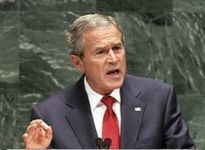Diplomacy needed to soften up Sudan on peacekeepers – UN
Oct 12, 2006 (WASHINGTON) — A senior United Nations official said Thursday the Sudanese government has been able to reject the proposed deployment of a U.N. peacekeeping force in Darfur because the United States and Britain have not done enough to sell the idea to countries around the world.
 Deputy Secretary-General Mark Malloch Brown credited President George W. Bush and British Prime Minister Tony Blair for the lead role they have taken in highlighting the suffering in Darfur. But he gave them low marks in their efforts to persuade countries to pressure President Omar el-Bashir to accept U.N. peacekeepers.
Deputy Secretary-General Mark Malloch Brown credited President George W. Bush and British Prime Minister Tony Blair for the lead role they have taken in highlighting the suffering in Darfur. But he gave them low marks in their efforts to persuade countries to pressure President Omar el-Bashir to accept U.N. peacekeepers.
Speaking to a gathering at the Brookings Institution, Malloch Brown said pressure must be applied to African and Asian nations to convince el-Bashir to change course.
He said the world must act quickly lest the grave situation in Darfur deteriorate further.
“We fear the worst because of the massive amount of Sudanese armament in the area,” Malloch Brown said.
The United Nations wants to deploy 20,000 troops and police in Darfur but el-Bashir has been inflexibly opposed.
Malloch Brown said el-Bashir may be resisting out of concern that deployment of U.N. peacekeepers could lead to the arrest of Sudanese officials indicted by the International Criminal Court.
Continued rejection by Sudan of U.N. peacekeepers could produce escalating pressures on Western countries to intervene militarily, he said, adding that it is questionable that leaders of these nations would be able to resist these pressures.
State Department spokesman Sean McCormack reacted sharply when informed of Malloch Brown’s comment about alleged U.S. laxity in enlisting international support for dispatching peacekeepers’.
“It’s hard to take those kind of criticisms seriously, especially when you look at exactly what this president and this secretary of state and the previous secretary of state have been doing to try to resolve this issue and to bring public attention to it,” he said.
McCormack added that the Darfur issue was a major focus of Secretary of State Condoleezza Rice during her recent consultations with a number of Arab leaders during travels in the Middle East.
As for expansion of the U.N. Security Council’s permanent membership, Malloch Brown recommended the additions of India, Brazil, Japan and Germany.
Stressing the need for procedural reform at the U.N., he cited the difficulty the Council had in July in securing a mere presidential statement expressing concern about the civilian casualties in the Israel-Hezbollah war.
He said he was “deeply troubled” by some actions of the new U.N. Human Rights Council, pointing to its “one-sided” resolution calling for an inquiry into Hezbollah civilian casualties during the war without reference to Israeli civilian casualties.
Malloch Brown welcomed the warmer attitude of the United States toward the United Nations, noting that issues of major U.S. interest — North Korea, Sudan and Iran — are now at the center of Security Council deliberations.
For the United States, “the pendulum has swung back to the U.N.,” he said. “It’s impossible to imagine the U.S. relying on a U.N. Security Council that didn’t produce results.”
He said 2003, when the United States invaded Iraq without the U.N.’s blessing, it “was the high noon of acting outside the U.N.”
(AP/ST)
